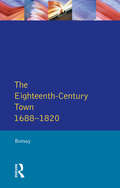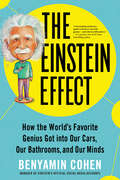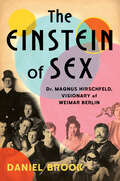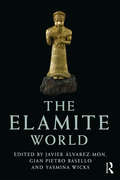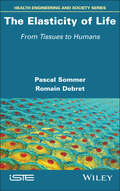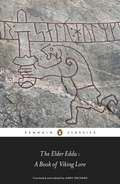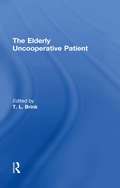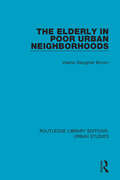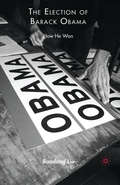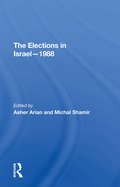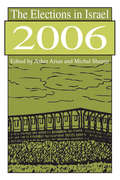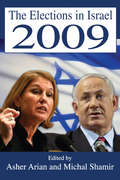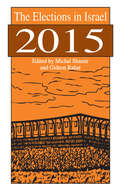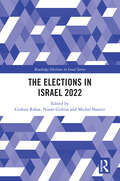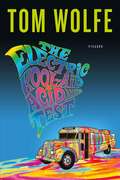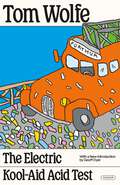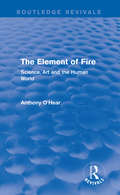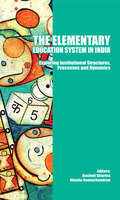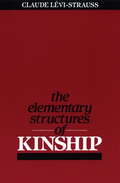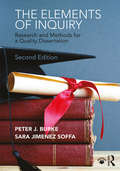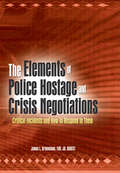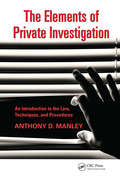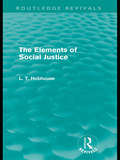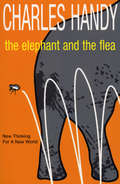- Table View
- List View
The Eighteenth-Century Town: A Reader in English Urban History 1688-1820 (Readers In English Urban History)
by Peter BorsayThe eighteenth century represents a critical period in the transition of the English urban history, as the town of the early modern era involved into that of the industrial revolution; and since Britain was the 'first industrial nation', this transformation is of more-than-national significance for all those interested in the histroy of towns. This book gathers together in one volume some of the most interesting and important articles that have appeared in research journals to provide a rich variety of perspectives on urban evelopment in the period.
The Einstein Effect: How the World's Favorite Genius Got into Our Cars, Our Bathrooms, and Our Minds
by Benyamin Cohen"A fascinating and funny guide to history's favorite genius—and why he still matters." —A.J. Jacobs, New York Times bestselling authorA fascinating look into how Einstein's genius and science continues to show up in so many facets of our everyday lives and his enduring legacy as an unlikely pop culture icon.Albert Einstein was the first modern-day celebrity and, decades after his death, still has the world's most recognizable face. His influence is seen in much of the technology we use every day: GPS, remote controls, weather forecasts, even toothpaste. But it's not just Einstein's scientific discoveries that continue to shape our world. His legacy underpins the search for aliens, the rescue of refugees, the invention of time machines, and the debunking of fake news. He appears in new books, TV shows, and movies all the time—and fans are paying millions for Einstein relics at auction.Award-winning author and journalist Benyamin Cohen has a bizarre side hustle as the manager of Einstein's official social media accounts, which have 20 million followers—more than most living celebrities. In The Einstein Effect, Cohen embarks on a global quest to unearth Einstein's ongoing relevance today. Along the way, he meets scientists and celebrities, speaks to dozens with the last name Einstein (including two rabbis), and even tracks down the brain of Einstein, stolen from his body during the autopsy. Cohen shows us the myriad ways the Nobel Prize winner's influence is still with us, giving an in-depth—and often hilarious—look at the world's favorite genius like you've never seen him before.Praise for The Einstein Effect:"Benyamin is a regular Joe with great humility, a tremendous sense of humor, a philosopher with an acute awareness of human connection, a gift to us all." —Mandy Patinkin, actor, singer, activist"I hope this book encourages others to be inspired by Einstein as well." —Christopher Lloyd, award-winning actor"A book for geniuses and the rest of us alike." —Derek Baxter, author of In Pursuit of Jefferson"A thoroughly entertaining new book." —Jeff Einstein, great-great nephew of Albert Einstein"Full of humor and surprises." —Paul Halpern, physics professor and author of Einstein's Dice and Schrödinger's Cat
The Einstein of Sex: Dr. Magnus Hirschfeld, Visionary of Weimar Berlin
by Daniel BrookAn illuminating portrait of a lost thinker, German-Jewish sexologist and activist Magnus Hirschfeld. More than a century ago, Dr. Magnus Hirschfeld, dubbed the “Einstein of Sex,” grew famous (and infamous) for his liberating theory of sexual relativity. Today, he’s been largely forgotten. Journalist Daniel Brook retraces Hirschfeld’s rollicking life and reinvigorates his legacy, recovering one of the great visionaries of the twentieth century. In an era when gay sex was a crime and gender roles rigid, Hirschfeld taught that each of us is their own unique mixture of masculinity and femininity. Through his public advocacy for gay rights and his private counseling of patients toward self-acceptance, he became the intellectual impresario of Berlin’s cabaret scene and helped turn his hometown into the world’s queer capital. But he also enraged the Nazis, who ransacked his Institute for Sexual Science and burned his books Driven from his homeland, Hirschfeld traveled to America, Asia, and the Middle East to research sexuality on a global scale. Through his harrowing lived experience of antisemitic persecution and a pivotal late-in-life interracial romance, he came to see that race, like gender, was a human invention. Hirschfeld spent his final years in exile trying to warn the world of the genocidal dangers of racism. Rich in passion and intellect, The Einstein of Sex at last brings together this unsung icon’s work on sexuality, gender, and race and recovers the visionary who first saw beyond the binaries. A century after his groundbreaking work—as the fights for personal freedom and societal acceptance rage on—Hirschfeld’s gift for thinking beyond the confines of his world has much to teach us
The Elamite World (Routledge Worlds)
by Javier Álvarez-Mon Gian Pietro Basello Yasmina WicksAmongst the civilizations to participate in the dynamic processes of contact and interchange that gave rise to complex societies in the ancient Near East, Elam has remained one of the most obscure, at times languishing in the background of scholarly inquiry. In recent years, however, an increasing body of academic publications have acknowledged its relevance and suggested that its legacy was more considerable and long-lasting than previously estimated. The Elamite World assembles a group of 40 international scholars to contribute their expertise to the production of a solid, lavishly illustrated, English language treatment of Elamite civilization. It covers topics such as its physical setting, historical development, languages and people, material culture, art, science, religion and society, as well as the legacy of Elam in the Persian empire and its presence in the modern world. This comprehensive and ambitious survey seeks for Elam, hardly a household name, a noteworthy place in our shared cultural heritage. It will be both a valuable introductory text for a general audience and a definitive reference source for students and academics.
The Elasticity of Life: From Tissues to Humans
by Pascal Sommer Romain DebretElasticity is absolutely necessary for living a normal life. This fact is cruelly revealed when respiratory, cardiac, digestive, sensory, motor, reproductive or aesthetic problems appear following the inexorable decline of our elastic capital. The protection and maintenance of this capital is one of life’s priorities since this declination begins at the age of twenty and accelerates in times of crises and pandemics. However, there are no therapies yet designed to remedy it. The first part of the book explains the consequences surrounding a lack of elasticity in the skin, the most visible decline, and then other defects in elasticity throughout our bodies, exploring places rarely mentioned. The second part describes the research fighting against elasticity anomalies and examines useful behaviors to protect our elastic capital (e.g. our diets and physical and cognitive activities). This last point is at the heart of current social debates on nutritional, behavioral, environmental and even ethical levels.
The Elder Edda: A Book of Viking Lore
by Andy OrchardCompiled by an unknown scribe in Iceland around 1270, and based on sources dating back centuries earlier, these mythological and heroic poems tell of gods and mortals from an ancient era: the giant-slaying Thor, the doomed Völsung family, the Hel-ride of Brynhild and the cruelty of Atli the Hun. Eclectic, incomplete and fragmented, these verses nevertheless retain their stark beauty and their power to enthrall, opening a window on to the thoughts, beliefs and hopes of the Vikings and their world.
The Elderly Uncooperative Patient
by T.L. BrinkAn invaluable resource for the mental health professional who must deal with the uncooperative and difficult elderly patient.
The Elderly in Poor Urban Neighborhoods (Routledge Library Editions: Urban Studies #6)
by Valerie Slaughter BrownFirst published in 1997. Considerable research has been done to identify neighbourhood influences on children’s affective states, motivation, and behaviour. This population, along with the elderly, are the nation’s largest dependent groups. In contrast, little research has been done to determine what impact living among poor neighbours has upon older Americans, specifically upon their psychological well-being and neighbourhood satisfaction. In this study the author has sought out to explore this deficit, using a sociological standpoint to examine quality-of-life issues relevant to elderly inner-city residents. This title will be of interest to students of sociology and urban studies.
The Election of Barack Obama
by Baodong LiuThe historic election of Barack Obama, the first African-American president is analyzed from the perspective of racial relations. To trace the effect of time, Liu links Obama's multiracial winning coalition to the two-party system and the profound impact of racial changes since 1965.
The Elections In Israel--1988
by Michal Shamir Asher ArianForty years after becoming an independent state, Israel is still involved in deadly strife with many of its Arab neighbors and with the Palestinians under its military control. The protracted Arab-Israeli conflict is one of the most fundamental features of the Israeli experience; it overshadows economic and social decisions, and often sets the poli
The Elections in Israel 2003
by Michal ShamirThe Elections in Israel--2003 brings together leading Israeli and North American social scientists and their state-of-the-art, in-depth analysis of the 2003 Israeli national elections. These elections returned Ariel Sharon and the Likud to power amid one of the bloodiest rounds of conflict between Israel and the Palestinians and a severe economic downturn in Israel. Contributors analyze the electoral behavior of the voters as a whole and various subgroups, highlighting social cleavages and identity, as well as issues and other strategic considerations. Three chapters analyze in detail the Arab, the national-religious, and the "Russian" vote. The 2003 elections saw Israel's return to the family of parliamentary nations after it experimented with the direct election of the prime minister from 1996 through 2001. The impact of the adoption and repeal of this unique Israeli system of government is another major topic covered in this volume, and several contributions explore the impact of these changes upon the electorate, the party system, and party financing. Other unusual features of the 2003 elections were the low turnout levels among Jewish and Arab voters; political moves to disqualify Arab candidates and lists from running for office, which were overruled by the Supreme Court of Israel; the collapse of the left, the spectacular showing of the centrist Shinui party, and the dominant status of the Likud in the Knesset and in Israeli politics. Through its focus on the 2003 elections, this volume also illuminates developments and changes in Israeli society and politics. Many of these developments--multiculturalism, changes in social stratification, the growing role of the judiciary and of the media, and political reforms--characterize other Western democracies as well, and these are discussed from a comparative perspective. The Elections in Israel--2003 will be of particular interest to those concerned with politics in Israel as well as those concerned with comparative politics and elections in general.
The Elections in Israel 2006
by Michal Shamir Asher ArianSeveral dramatic events preceded the elections to the Seventeenth Knesset on March 28, 2006, beginning with the unilateral withdrawal from Gaza in August 2005 and its attendant and unprecedented removal of Jewish settlements and settlers, followed by major shifts among and within the various political parties. Most dramatic was the split in Likud when Prime Minister Ariel Sharon decided to form a new party, Kadima, leading to the breakup of the Likud party that Sharon had formed in 1973. This volume charts the 2006 elections.
The Elections in Israel 2009
by Michal ShamirThe elections to the 18th Knesset (legislature of Israel) were held on February 10, 2009, almost three years after the elections to the 17th Knesset and approximately twenty months before the original date set for them to be held. The elections are best understood in the context of the wars that were at each end of Ehud Olmert's government tenure, corruption scandals involving the prime minister, and the failure of Tzipi Livni, the newly elected head of the ruling center party, Kadima to form a new coalition following Olmert's resignation.The election campaign of 2009 began with the resignation of Ehud Olmert in the shadow of his corruption scandals and issues of integrity and clean government. This was followed by the world financial crisis, which directed attention towards the economic dimension and performance of the candidates. On the face of it, the campaign was cut short when military action began in Gaza. Still, the election was on the minds of candidates, and the question of who can best ensure security prevailed in the campaign. It becamepersonalized and focused on the candidates: the two candidates who had once headed the government and aspired to return, Benjamin Netanyahu and Ehud Barak, and the chairperson of Kadima, Tzipi Livni, who was running for the first time as head of a party.The Elections in Israel 2009 will be of particular interest to those concerned with comparative politics and elections in an open society. This volume is the latest in the series begun in 1969.
The Elections in Israel 2015 (Elections of Israel)
by Gideon Rahat Michal ShamirThe newest volume in the Elections in Israel series focuses on the twentieth Knesset elections held in March 2015 following the collapse of the third Netanyahu government. Prime Minister Benjamin Netanyahu’s main opposition party, the Zionist Camp, ran a negative personalized election campaign, assuming that Israelis had grown tired of him. Netanyahu, however, achieved a surprising and dramatic victory by enhancing and radicalizing the same identity politics strategies that helped him win in 1996. The Elections in Israel 2015 dissects these and other campaigns, from the perspective of the voters, the media and opinion polls, the political parties, and electoral competition. Several contributors delve into the Left and Arab fear mongering Likud campaign, which produced strategic identity voting. Other contributions analyze in-depth the Israeli party and electoral systems, highlighting the exceptional decline of the mainstream parties and the adoption of a higher electoral threshold. Providing a close analysis of electoral competition, legitimacy struggles, stability and change in the voting behavior of various groups, partisanship, personalization and political polarization, this volume is a crucial record of Israeli political history.
The Elections in Israel 2022 (Elections of Israel)
by Gideon Rahat, Noam Gidron and Michal ShamirThe 2022 Israeli elections stand out as a turning point in the country’s political history. Following a period of unprecedented political instability, the right-wing government formed following the elections—Benjamin Netanyahu's sixth government—was the most radical in Israel’s history.This book examines the 2022 Israeli elections through various theoretical perspectives and diverse research designs and data sources. The first part scrutinizes various aspects of Israeli democracy related to the elections. These include ideological and affective polarization, cleavages, voter turnout, involvement of citizens and civil organizations in election campaigns and the nature of the government that was established following the elections. The second part of the book presents studies of parties that participated in the elections: those that declined (Labor), those that ascended (Religious Zionism and Otzma Yehudit), and those that ascertained their power (United Torah Judaism and Shas). A valuable addition to the Elections in Israel series, the book—written by leading scholars of Israeli politics and society—touches on key themes, including political personalization, polarization, populism, the radical right, party decline and adaptation and democratic backsliding.The book will be of particular interest to students and researchers of Israeli politics and society—especially relating to the events of 2023 and the war in Gaza—as well as to social scientists interested in these political phenomena and their effects on democratic countries worldwide.
The Electric Kool-Aid Acid Test
by Tom WolfeWolfe takes a walk on the wild side with Ken Kesey and his Merry Pranksters and writes about the 1960s hippie culture.
The Electric Kool-Aid Acid Test
by Tom WolfeOne of the most essential works on the 1960s counterculture, Tom Wolfe's The Electric Kool-Aid Test ushered in an era of New Journalism. This is the seminal work on the hippie culture, a report on what it was like to follow along with Ken Kesey and the Merry Pranksters as they launched the "Transcontinental Bus Tour" from the West Coast to New York, all while introducing acid (then legal) to hundreds of like-minded folks, staging impromptu jam sessions, dodging the Feds, and meeting some of the most revolutionary figures of the day."An American classic" (Newsweek) that defined a generation. "An astonishing book" (The New York Times Book Review) and an unflinching portrait of Ken Kesey, his Merry Pranksters, LSD, and the psychedelic 1960s.
The Element of Fire: Science, Art and the Human World (Routledge Revivals)
by Anthony O'HearFirst published in 1988, the aim of this book can be stated in Nietzsche’s words: ‘To look at science from the perspective of the artist, but at art from that of life’. The title contests the notions that science alone can provide us with the most objective truth about the world, and that artistic endeavour can produce nothing more valuable than entertainment. O’Hear argues that art and the study of art are not indispensable aspects of human life, and that this is equally as important as the investigation of the natural world.
The Elementary Education System in India: Exploring Institutional Structures, Processes and Dynamics
by Rashmi Sharma Vimala RamachandranThis book focuses on the failure of elementary education since Independence, which is usually seen as the result of simplified phrases like 'lack of political will', 'because of poverty', etc. This book looks at the system as a whole: infrastructure, quality of teaching, privatisation, nutritional incentives, curriculum. It contains samples from two states namely Rajasthan and Andhra Pradesh.
The Elementary Structures of Kinship
by Claude Levi-StraussProfessor Lévi-Strauss's first major work, Les Structures élémentaires de la Parenté, has acquired a classic reputation since its original publication in 1949; and it has become the constant focus of academic debate about central theoretical concerns in social anthropology. It is, however, a long and difficult book for many students to read in French, and its arguments have consequently become known, even among professional anthropologists, largely through critical analysis. It was republished in a revised French edition in 1967 with a new foreword by the author, and it is this text with his further emendations that has been used in this translation.Lévi-Strauss applies his intellectual powers to the perennial problem of incest, which he elucidates by means of the concept of exchange as formulated by Marcel Mauss in his famous analysis of the gift (Essai sur le don, 1925). He distinguishes two elementary modes of exchange which govern not only the conventional variety of goods and services but also the transfer of women in marriage: these are "restricted" and "generalized" exchange. With a mass of ethnographic evidence he demonstrates how the formidable intricacy of marriage customs, comprising moral and jural ideas and institutions (which appear to be essentially arbitrary), can be seen as local and historical rules of exchange.Charles Lévi-Strauss traces these rules throughout a vast range of simple societies, chiefly in Australia and mainland Southeast Asia but also in the Americas, in Oceania, and in other parts of the world. To this survey he adds two extended sections on the great civilizations of China and India. He continues with a briefer consideration of the passage from elementary to complex structures, with particular reference to African societies, and concludes with a stimulating chapter on the principles of kinship, exchange as the universal basis for marriage prohibitions, and the formal relations between the sexes as part of a universe of communication.Although much of the work is technical, consisting of detailed analyses of types of social organization with which social anthropologists will be most familiar, it also contains much that will be of interest to psychologists, linguists, and philosophers, and to all who are interested in the possibility and the technique of the structural analysis of human activity. After the successes, moreover, of Lévi-Strauss's subsequent books--notably Structural Anthropology, Tristes Tropiques, Totemism, and The Savage Mind--this new edition of the work which founded his present outstanding reputation will have additional value as a further means of contact with one of the original minds of this century.The translation has been made by James Harle Bell and John Richard von Sturmer, of the University of New England, Australia, and by Rodney Needham, of the University of Oxford. Dr. Needham also acted as general editor and supplied the work with a new general index. He is the translator of Lévi-Strauss's Le Totemisme aujourd'hui and author of Structure and Sentiment (1962) and numerous papers which have contributed to the recognition of Professor Lévi-Strauss's work in the English-speaking world.
The Elements of Inquiry: Research and Methods for a Quality Dissertation
by Peter J. Burke Sara Jimenez SoffaThe Elements of Inquiry covers the basic guidelines for graduate students doing an investigation or inquiry project. It distils the rubrics necessary for teaching research methods and completing research projects, and gives the student researcher a list of steps to follow to complete any type of inquiry project – including formal research projects such as doctoral dissertations. It was written to support the work of students in an educational leadership doctoral program, but it will also assist the research efforts of college students at any level in any discipline. The book begins by establishing the underlying philosophical concepts upon which all good research is based, preparing students to get down to the "nuts and bolts" of conducting their own research and evaluating the research of others. Fundamental concepts and rules of research are explained both for producers and consumers of social science and educational research. Numerous practical examples illustrate the steps in the research process presented in the text. There are end-of-chapter exercises for students to apply the concepts discussed in the chapter. Templates for organizing and presenting research provide students with a game plan for success with their research. The book ends with an up-to-date annotated bibliography of beginning and advanced research texts allowing students easy access to books that detail the more specialized research topics. While most research books detail one or more method in depth, this text provides a broad introduction to many techniques and models used in doctoral dissertations, and will be of particular value to those who are consumers of inquiry studies and research reports. Key to the overview provided is the annotated bibliography that leads the reader to the next stage of understanding or doing research.
The Elements of Police Hostage and Crisis Negotiations: Critical Incidents and How to Respond to Them
by James L GreenstoneRun a safe and successful crisis negotiation-from start to finish! The Elements of Police Hostage and Crisis Negotiations: Critical Incidents and How to Respond to Them reduces the negotiation procedures for hostage, barricaded, and suicide incidents to their basic elements, providing quick and easy access to the information you need-from the initial call-out to the final debriefing. Based on field-tested principles proven to work, the book also includes newly developed and highly specialized techniques for more experienced negotiators. Author James L. Greenstone provides a user-friendly, step-by-step guide to the intervention and negotiation process that will help you get the job done-right. Designed for day-to-day, on-the-scene use, The Elements of Police Hostage and Crisis Negotiations is a practical handbook for experienced professionals and novices that can also be used as a supplementary textbook for criminal justice, crisis intervention, and psychology coursework. Each chapter contains useful checklists, procedural notes, tables, strategy worksheets, and forms, and the book includes special indices for quick reference in addition to a traditional index. Dr. Greenstone, a police mental health consultant and psychologist who served as Director of the Psychological Services Unit of the Fort Worth Police Department in Texas, uses a simple and direct format that emphasizes procedures, action and results, leaving theoretical discussions for another time and place. The book examines the negotiation process from start to finish, including preincident preparations, first response responsibilities, responding to the call-out, arriving at the scene, preparing to negotiate, making contact, preparing for the surrender, post-incident tasks, preparing equipment, and more. Topics covered in The Elements of Police Hostage and Crisis Negotiations include: legal considerations telephone surveillance guidelines the Stockholm Syndrome working with S.W.A.T. and Tactical Emergency Medical Support dealing with the media recognizing "red flags" the issues of suicide debriefing the hostage team the 150 laws of hostage and crisis negotiation and the 10 most serious errors a negotiator can make The Elements of Police Hostage and Crisis Negotiations: Critical Incidents and How to Respond to Them is a practical guide that&’s equally effective in the field, in training, and in the office.
The Elements of Private Investigation: An Introduction to the Law, Techniques, and Procedures
by Anthony ManleyIn today‘s increasingly litigious society, the threat of a private investigator (PI) being hit with a civil lawsuit or even criminal charges is very real. Keeping up with the multitude of laws that impact what investigators can and can‘t do can be daunting but could prove very costly if ignored.Emphasizing legal and liability issues, The Elements o
The Elements of Social Justice (Routledge Revivals)
by L. T. HobhouseFirst published in 1922, this title written by L. T. Hobhouse, British politician and one of the leading theorists of Social Liberalism, is a seminal work concerning the social application of ethical principles for the common good. The object of the book is to show that social and political institutions are not ends in themselves. Hobhouse argues that the social ideal is to be sought not in the faultless unchanging system of an institutional Utopia, but in the love of a spiritual life with its unfailing system of harmonious growth unconfined.
The Elephant And The Flea
by Charles HandyBookseller Charles Handy's best-selling new book looks at how individuals (the fleas in his analogy) relate to multi-national conglomerates (the elephants). In addition to addressing how and why we work today, he covers a wide range of preoccupations and issues including the increasing fear of big business: 'it is easy to see why many observers think that the big corporations are now both richer and more powerful than many nation states. They worry that these new corporate states are accountable to no-one - that their financial clout makes governments beholden to them ... The elephants, people feel, are out of control.'
